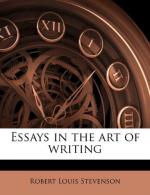Feeling. The total of a nation’s reading,
in these days of daily papers, greatly modifies the
total of the nation’s speech; and the speech
and reading, taken together, form the efficient educational
medium of youth. A good man or woman may keep
a youth some little while in clearer air; but the
contemporary atmosphere is all-powerful in the end
on the average of mediocre characters. The copious
Corinthian baseness of the American reporter or the
Parisian chroniquear, both so lightly readable, must
exercise an incalculable influence for ill; they touch
upon all subjects, and on all with the same ungenerous
hand; they begin the consideration of all, in young
and unprepared minds, in an unworthy spirit; on all,
they supply some pungency for dull people to quote.
The mere body of this ugly matter overwhelms the
rare utterances of good men; the sneering, the selfish,
and the cowardly are scattered in broad sheets on
every table, while the antidote, in small volumes,
lies unread upon the shelf. I have spoken of
the American and the French, not because they are so
much baser, but so much more readable, than the English;
their evil is done more effectively, in America for
the masses, in French for the few that care to read;
but with us as with them, the duties of literature
are daily neglected, truth daily perverted and suppressed,
and grave subjects daily degraded in the treatment.
The journalist is not reckoned an important officer;
yet judge of the good he might do, the harm he does;
judge of it by one instance only: that when
we find two journals on the reverse sides of politics
each, on the same day, openly garbling a piece of news
for the interest of its own party, we smile at the
discovery (no discovery now!) as over a good joke
and pardonable stratagem. Lying so open is scarce
lying, it is true; but one of the things that we profess
to teach our young is a respect for truth; and I cannot
think this piece of education will be crowned with
any great success, so long as some of us practise
and the rest openly approve of public falsehood.
There are two duties incumbent upon any man who enters
on the business of writing: truth to the fact
and a good spirit in the treatment. In every
department of literature, though so low as hardly
to deserve the name, truth to the fact is of importance
to the education and comfort of mankind, and so hard
to preserve, that the faithful trying to do so will
lend some dignity to the man who tries it. Our
judgments are based upon two things: first, upon
the original preferences of our soul; but, second,
upon the mass of testimony to the nature of God, man,
and the universe which reaches us, in divers manners,
from without. For the most part these divers
manners are reducible to one, all that we learn of
past times and much that we learn of our own reaching
us through the medium of books or papers, and even
he who cannot read learning from the same source at
second-hand and by the report of him who can.




